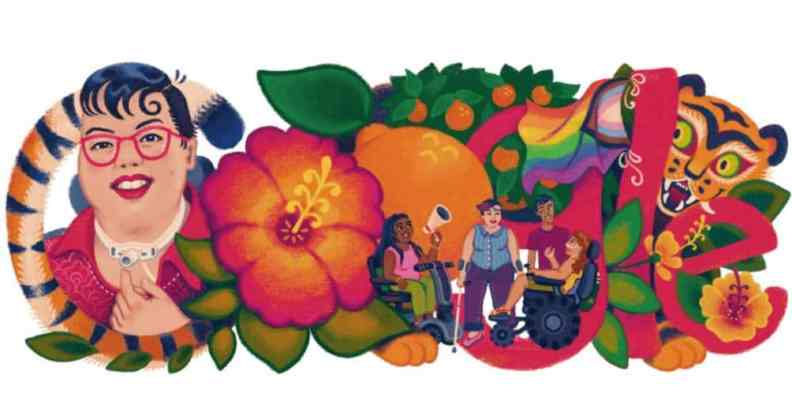Google Doodle honours queer Korean-American disability justice activist Stacey Park Milbern

Google is honouring the late Stacey Park Milbern, a queer champion of the disability rights movement, with a doodle on what would have been her 35th birthday. (Google)
Google is celebrating Stacey Park Milbern, a queer activist for the disability rights movement, with a striking doodle on what would have been her 35th birthday.
The Korean-American activist helped create the disability justice movement and advocated for the fair treatment of marginalised peoples in the US. Milbern, who had muscular dystrophy, was born on 19 May 1987 in Seoul, South Korea and eventually found her home in the Bay Area of San Francisco, California.
She identified as queer and was a widely respected figure in the disability justice movement because of her diehard advocacy for disabled LGBTQ+ and people of colour.
Tragically, she died on 19 May 2020 at a hospital in Stanford, California after suffering from complications during an earlier surgery. It was her 33rd birthday.
Two years later, Google is honouring Stacey Park Milbern’s legacy with a beautiful doodle featuring a gorgeous illustration of the iconic activist, a tiger, a progressive Pride flag and colourful plant imagery.
The stunning Google Doodle was designed by Art Twink – a disabled, queer Bengali-American artist who is based in San Francisco-based guest artist – and the image was released on what would be Milbern’s 35th birthday.
The activist’s sister, Jessica, said the family is “honoured” that Google would celebrate Milbern’s legacy at a time when many of her loved ones are “revisiting the imprint she left on their lives”.
“Stacey was a pioneer for disability justice and intersectionality,” Jessica said. “Her life experiences led her to empower and revitalise others.”
Jessica continued: “Stacey taught us that everyone is valuable, despite what society may say, and that each person has an important role to play.
“She advocated for movements to move at the pace of the slowest person so that no one is left behind and used her voice to amplify the voices of underserved communities.”
Jessica recalled how Stacey Park Milbern’s passing was “devastating for many of us” not just because of her work but also because of her “connections with people on a personal level”.
Andraéa LaVant, Milbern’s friend and who was a consultant for the Google Doodle, said she missed her ‘dear, sister-friend’s’ laugh the most as she had a “giggle that said so much”. LeVant described how the small sound expressed everything including “joy, lightness and freedom”.
She said that Milbern “boldly” embraced “every single aspect” of her “communities and identities without shame”. LeVant added that she learned the art of “taking up space” and “being unapologetic” from the amazing advocate.
“She never apologised for ensuring her needs were met,” LeVant said. “She was fully and completely herself, and that’s what I loved so much about her and what I love about this Doodle created by Art Twink.”
She continued: “It depicts the full joy and pride Stacey had for herself and the communities she represented.”
In March 2020, Stacey Park Milbern and friends created a group called the Disability Justice Culture Club. The group created homemade kits – which included masks, vitamins and gloves – to help homeless people at risk as the number of COVID-19 cases began to rise in the US.
“Often times, disabled people have the solutions that society needs. We call it crip — or crippled — wisdom,” Milbern told KQED.
“We know how infections spread and how to properly wear a mask and wash your hands.”
Milbern told the outlet that she had recently been diagnosed with kidney cancer and was told by a surgeon that it was “fast growing”. Despite her ill health, Milbern said she was still doing all that she could to help others as it is “such a painful experience to be left behind or disregarded”.
“I have experienced feeling neglected by systems and society, and I don’t want that to continue,” Milbern said. “If I can use my skills developing care networks to keep someone a little more safe, it was all worth it.”

